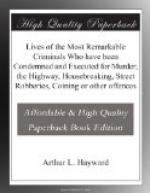As it often happens that boisterous and unruly people, either in frays or out of revenge, do very great injuries unto others, yet without taking away their lives, in such a case the Law adjudges the offender who commits a mayhem to the severest penalties. The true definition of a mayhem is such a hurt whereby a man is rendered less able in fighting, so that cutting off or disabling a man’s hand, striking out his eye, or foretooth, were mayhems at Common Law. But by the Statute of King Charles the Second, if any person or persons, with malice aforethought, by lying in wait, unlawfully cut out or disable the tongue, put out an eye, slit the nose, or cut off the nose or lip of any subject of his Majesty, with an intention of maiming or disfiguring, then the person so offending, their counsellors, aiders and abetters, privy to the offence, shall suffer death, as in cases of felony, without benefit of clergy; which Act is commonly called the Coventry Act, because it was occasioned by the slitting of the nose of a gentleman of that name, for a speech made by him in Parliament.[1]
As nothing is of greater consequence to the commonwealth than public credit, so the Legislature hath thought fit, by the highest punishments, to deter persons from committing such facts for the lucre of gain, as might injure the credit of the nation. For this purpose, an Act was made in the reign of the late King William, by which forging or counterfeiting the common seal of the Governor and Company of the Bank of England, or of any sealed bank-bill given out in the name of the said Governor and Company for the payment of any sum of money, or of any bank-note whatsoever, signed by the said Governor and Company of the Bank of England, or altering or raising any bank-bill, or note of any sort, is declared to be felony, without benefit of clergy. Upon this Statute there have been several convictions, and it is hoped men are pretty well cured of committing this crime, by that care those in the direction of the Bank have always taken to bring offenders of this kind to justice.
By an Act also passed in the reign of King William, persons who counterfeit any stamp which by its mark relates to the Revenue, shall be guilty of felony without benefit of clergy, and upon this also there have been some executions.
But as the public companies established in this kingdom have often occasion to borrow money under their common seal, which bonds, so sealed, are transferable and pass currently from hand to hand as ready money, so for the greater security of the subject the counterfeiting the common seal of the South Sea Company, or altering any bond or obligation of the said company, is rendered felony without benefit of clergy. Some other statutes of the same nature in respect to lottery tickets, etc., have been made to create felonies of the counterfeiting thereof, but of these and some other later Statutes, I forbear mentioning here, because I have spoken particularly of them in the cases where persons have been punished for transgressing them.




